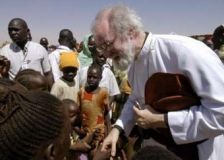Archbishop of Canterbury visits Sudan, preaches tolerance
Feb 26, 2006 (KHARTOUM) — Rowan Williams, the spiritual leader of more than 70 million Anglicans worldwide, appealed for religious tolerance on Sunday after arriving in Sudan where a peace deal last year ended two decades of civil war.
 “So many of these conflicts are about who is to be king,” the Archbishop of Canterbury told a crowd of more than a thousand Sudanese Christians in Khartoum, where Islamic sharia law is in force.
“So many of these conflicts are about who is to be king,” the Archbishop of Canterbury told a crowd of more than a thousand Sudanese Christians in Khartoum, where Islamic sharia law is in force.
“Together as groups, as tribes … as religions, we know that God alone is king and we can therefore be at peace with each other,” he said.
Williams will spend a week in Sudan to preach a message of coexistence after the 2005 peace deal that ended civil war in the country’s south. He will travel to southern Sudan to open a Cathedral and visit United Nations feeding programmes.
Religious differences and the imposition of sharia law in 1983 were key issues in the north-south civil war — Africa’s longest — which claimed more than 2 million lives, mostly from famine and disease.
But the peace deal saw the Islamist ruling party form a coalition government with its former foes, the mostly Christian and animist southern rebels, the Sudan People’s Liberation Movement (SPLM).
OIL WEALTH
While sharia law is still in effect, non-Muslims say they notice a more open attitude towards them in the national capital. However, a commission to protect the rights of non-Muslims in Khartoum, as written into the peace deal, has yet to be formed.
The south has also complained that it has yet to receive the full share of half of Sudan’s oil revenues, saying there is no transparency in the oil ministry. The minister says production is around 330,000 barrels per day, but southerners feel it could be as high as 450,000 or half a million bpd.
“I shall want to know more about how you will come to have a full share in the good things of this country,” Williams told the whooping Christians in his first public address.
After visiting one of the slum camps surrounding Khartoum, where millions of southerners fled during the war, he said he also wanted to work to ensure that when they decided to return home, there was food, water and roads for them to enjoy.
Southern Sudan is one of the poorest areas on earth with little access to clean water, electricity, only a few kilometres of Tarmac roads and the lowest rate of school enrolment in the world.
The archbishop’s followers were ecstatic to meet him. A choir sang welcome Rowan Williams to African beats and young men put on a play about Christianity, a rare sight after the government restricted theatre during the 1990s.
“Now with peace we are much more accepted in society,” said 19-year-old Christian Cecelia Samuel. “Things used to be different and we were repressed, but now we have our people in government and things are so much better.”
The southern peace deal does not cover a separate three-year-old conflict in the western Darfur region or a simmering rebellion in the east.
